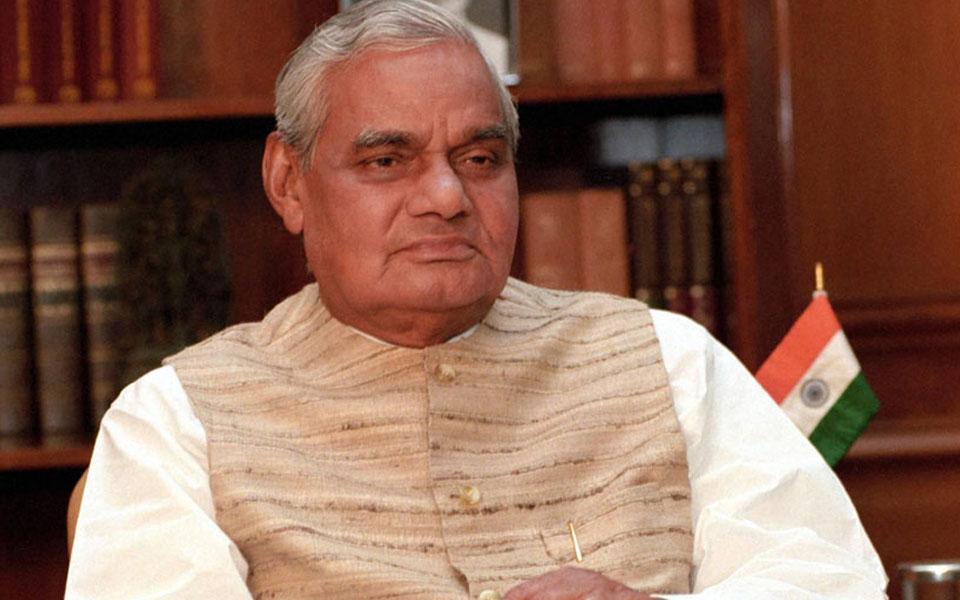New Delhi: Atal Bihari Vajpayee who thrice served as the Prime Minister of India has passed away at the age of 93. He was admitted to the All India Institutes of Medical Sciences (AIIMS) here in June with kidney tract infection and chest congestion and was on life support system. He is survived by his adopted daughter and granddaughter.
Atal Bihari Vajpayee had always remained a bachelor and never married. He had an adopted daughter named Namita Bhattacharya who is the daughter of Rajkumari Kaul, Vajpayee’s classmate at Gwalior's Victoria College (now Laxmi Bai College) and his companion of many years. Namita is married to Ranjan Bhattacharya who also served as an Officer on Special Duty, while his father-in-law was the Prime Minister of India. The couple has one daughter Neharika.
The family association between the Kauls and Vajpayee dates back to his Gwalior days. After the death of Brij Narain Kaul, Rajkumari Kaul’s husband, Vajpayee became an integral and inseparable part of his household.
Vajpayee served as the Member of Parliament for Lucknow, Uttar Pradesh, until 2009 when he retired from active politics due to health concerns. One of the founding fathers of Bharatiya Jana Sangh, he was also the head of the organisation from 1968 to 1972. Vajpayee formed Bharatiya Janata Party in 1980 when the Janata Party collapsed.
He was the first non-Congress prime minister to serve a full five-year term. The government of India conferred the nation’s highest civilian honour, the Bharat Ratna, on him in 2014. 25 December, his birthday was declared as Good Governance Day by the Narendra Modi government in 2014.
courtesy : timesnownews.com
Let the Truth be known. If you read VB and like VB, please be a VB Supporter and Help us deliver the Truth to one and all.
Bengaluru (PTI): The Karnataka government has issued directions to municipal corporations across the state to regulate and prohibit feeding pigeons in public places, citing serious public health concerns.
Deputy Secretary to Government V Lakshmikanth has written to the Urban Development Department requesting it to issue directions to the Greater Bengaluru Authority (GBA) and all municipal corporations to take immediate steps to implement the measures.
In an official note dated December 16 issued by the Health and Family Welfare Department and released to the media on Wednesday, the department said uncontrolled feeding of pigeons in public places has resulted in large congregations of birds, excessive droppings and serious health concerns, particularly respiratory illnesses linked to prolonged exposure to pigeon droppings and feathers such as hypersensitivity pneumonitis and other lung diseases.
ALSO READ: Chinese GPS tracker found on seagull near Karwar Coast
"The commissioner, the Greater Bengaluru Authority and the Commissioners and chief officers of other municipal corporations shall take necessary action to mitigate the causes of dangerous disease spread by pigeon and enforce specified guidelines in their respective jurisdiction," the note said.
According to the department, these include a prohibition on feeding pigeons or causing pigeons to be fed in areas where it may cause nuisance or pose a health hazard to the public. Pigeon feeding shall be permitted only in designated areas in a controlled manner, subject to certain conditions.
"The designated areas may be selected in consultation with stakeholders. The responsibility for upkeep of the designated areas and compliance to the directions shall be taken up by some charitable organisation or an NGO. The feeding in designated areas shall be permitted only for some limited hours in the day," it said.
The note further stated that authorised officers of local authorities shall issue on-the-spot warnings and may impose fines for violation of the order, or lodge complaints to prosecute offenders under Sections 271 (Negligent act likely to spread infection of disease dangerous to life) and 272 (Malignant act likely to spread infection of disease dangerous to life) of the Bharatiya Nyaya Sanhita.
It also directed local authorities to conduct public awareness campaigns, including the display of signboards, banners and digital messages, explaining the health hazards associated with pigeon droppings and feathers, the content of the regulatory directions and penalties for violations, and alternative humane methods of bird conservation that do not endanger public health.





